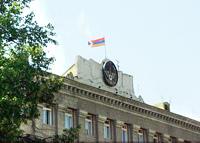After the end of the negotiations in Paris, many are talking about the fact that the negotiations failed.
During a recent press conference, Minister of Foreign Affairs of Armenia Vartan Oskanyan announced that the official Yerevan and Stepanakert agree with the new principles of the OSCE Minsk Group for the Karabakh conflict resolution, however they do disagree with some elements of the document.
Which principles are agreed on? What elements is the minister talking about? Are they beneficial for Karabakh?
Head of the foreign relations committee of the Karabakh National Assembly Vahram Atanesyan doesn’t believe that the recent negotiations failed completely.
“The proof of success is that the Armenian and Azerbaijani Foreign Ministers have both agreed to meet again. Secondly, I don’t remember a time when Oskanyan has definitely said that Yerevan and Stepanakert are ready for a resolution based on the principles proposed by the Minsk Group. I think that the willingness of Karabakh to approve the proposed principles is based on the role of Baku. This is the approach and I really don’t see any other outlook besides getting the agreement from both sides,” said V. Atanesyan.
Veteran of the Artsakh war Armen Danielyan believes that all negotiations are led the way superpowers want them to be led (the interests of countries with small populations are going to be neglected).
“The problem is that our survival may be put to the test if we commit an error in diplomacy. But it all depends on us. If we can create a strong economy, have a country where the law reigns supreme, perfect the army, then nobody will be able to tell us the “rules of the game” in diplomacy. The Karabakh issue will go on as long as we continue to be economically dependent of foreign powers. We can never think that foreign countries are going to think about us, or protect our interests. Everything goes on backstage and is supervised by the great powers. We mustn’t think about what they’re going to talk about during the negotiations, but rather about how we can get stronger so that we can dictate our own rules of the game. These days great powers are trying to establish their supremacy not by war, but by pressuring other countries economically and changing the moral/spiritual values. Unfortunately, we can’t resist this for the time being. No matter how the negotiations go and what they propose, one thing is for sure: we must never cede the land because the liberated lands of Karabakh are not only a place to call home, but also they are part of the Homeland and a security zone,” said Armen Danielyan.
As for former deputy Defense Minister of Nagorno Karabakh and Karabakh National Assembly MP Vitali Balasanyan, he believes that the only way to establish peace is not to have Armenia and Azerbaijan sign a peace treaty, but rather Karabakh and Azerbaijan.
“The international community doesn’t want to evaluate the reasons for the Karabakh war. But after all, those are the reasons for what happened after the war, the responsibility and achievements of both sides. Besides that, the Karabakh issue has moved from the Karabakh-Azerbaijan relations level to the Armenian level, when Armenia should only be the one to guarantee the security of the people of Karabakh and the intermediary for the conflict negotiations. I believe that the Ministry of Foreign Affairs of Armenia should refuse to take part in the negotiations with Azerbaijan,” says Vitali Balasanyan. He also added that he doesn’t accept that the issues concerning the conflict resolution of vital importance for the people of Karabakh should be discussed with the public and the Karabakh parliament.
The Karabakh authorities shouldn’t agree with the principles proposed by the Minsk Group. As for the allocation of peacekeeping troops, I must say that the Karabakh-Azerbaijani border is very safe and there is no need for peacekeepers. Besides that, as far as I remember, the announcements about peacekeeping troops refer to the allocation of troops on the Armenian-Azerbaijani border. In regard to the refugees, I believe that each person decides where to live. After the signing of the agreement, people can choose where to reside. But if anyone is talking about rehabilitation by force, then he must think about the status of more refugees.”
V. Balasanyan also touched upon the issue concerning the return of lands, stating that nobody realizes what lands they are talking about.
“If Azerbaijan is talking about the lands that were under the control of Soviet Union, that means that they refer to the events that happened during the Soviet Union. Karabakh doesn’t think so. The people who talk about the return of lands, my advice to them would be to pay another visit to the genocide museum, look at the pictures and then decide: to give or not to give the lands?” said general/major Vitali Balasanyan.

